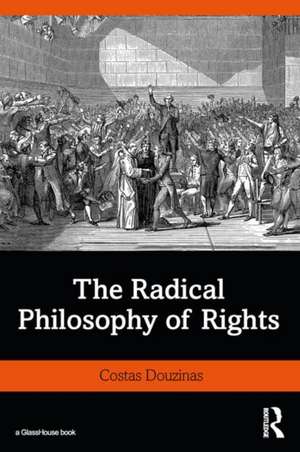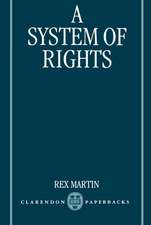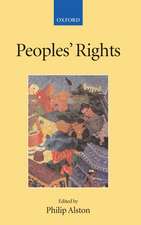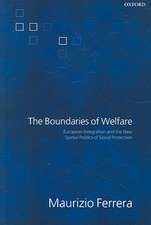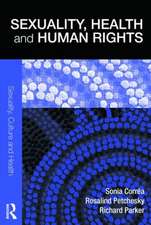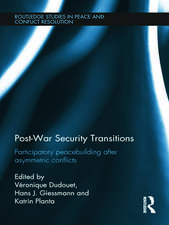The Radical Philosophy of Rights
Autor Costas Douzinasen Limba Engleză Paperback – 28 iun 2019
The book examines the history and philosophy of the (legal) person, the subject, the human and dignity from classical Rome to postmodern Brussels. It traces the gradual abandonment of right, virtue and the common good for individual rights and self-interest. The limited and distorted conception of rights of liberal jurisprudence is contrasted with an alternative that sees rights as a relation involved in the struggle for recognition and an everyday utopia. The right to resistance and revolution, prohibited but regularly returning like the repressed, rescues law from sclerosis and presents a case study of the paradoxical nature of rights. Finally, the book offers a brief examination of law’s encounter with radical politics informed by the author’s strange experience as an ‘accidental’ politician in the first radical left government in Europe. The book’s radical concept of legal philosophy and public law will be of considerable value to legal theorists, political philosophers and anyone with an interest in thinking and acting in ways that go beyond the limits of liberal, and neoliberal, ideology.
| Toate formatele și edițiile | Preț | Express |
|---|---|---|
| Paperback (1) | 365.91 lei 6-8 săpt. | |
| Taylor & Francis – 28 iun 2019 | 365.91 lei 6-8 săpt. | |
| Hardback (1) | 1002.80 lei 6-8 săpt. | |
| Taylor & Francis – 25 iun 2019 | 1002.80 lei 6-8 săpt. |
Preț: 365.91 lei
Nou
Puncte Express: 549
Preț estimativ în valută:
70.03€ • 72.84$ • 57.81£
70.03€ • 72.84$ • 57.81£
Carte tipărită la comandă
Livrare economică 14-28 aprilie
Preluare comenzi: 021 569.72.76
Specificații
ISBN-13: 9781138025103
ISBN-10: 1138025100
Pagini: 246
Dimensiuni: 156 x 234 x 18 mm
Greutate: 0.36 kg
Ediția:1
Editura: Taylor & Francis
Colecția Routledge
Locul publicării:Oxford, United Kingdom
ISBN-10: 1138025100
Pagini: 246
Dimensiuni: 156 x 234 x 18 mm
Greutate: 0.36 kg
Ediția:1
Editura: Taylor & Francis
Colecția Routledge
Locul publicării:Oxford, United Kingdom
Public țintă
Postgraduate and UndergraduateCuprins
Introduction: life between university and parliament
PART I
Law, persons, rights
Prologue: are women and animals persons?
1 A brief history of the person
2 The story of dignitas
3 What is the legal person?
4 Subject, individual, human
5 Legality after virtue: from (objective) right to (subjective) rights
PART II
The paradoxes of rights
6 The paradoxes of human rights
7 Rights, identity, desire
8 Marx, the radical left and rights
9 The poverty of (rights) jurisprudence
PART III
The right to resistance
10 Philosophy and resistance
11 The ‘right to the event’: the legality and morality of revolution and resistance
12 Prolegomena towards a theory of righting
Epilogue: critical legal studies goes Greek
Bibliography
Index
PART I
Law, persons, rights
Prologue: are women and animals persons?
1 A brief history of the person
2 The story of dignitas
3 What is the legal person?
4 Subject, individual, human
5 Legality after virtue: from (objective) right to (subjective) rights
PART II
The paradoxes of rights
6 The paradoxes of human rights
7 Rights, identity, desire
8 Marx, the radical left and rights
9 The poverty of (rights) jurisprudence
PART III
The right to resistance
10 Philosophy and resistance
11 The ‘right to the event’: the legality and morality of revolution and resistance
12 Prolegomena towards a theory of righting
Epilogue: critical legal studies goes Greek
Bibliography
Index
Notă biografică
Costas Douzinas is Professor of Law and Founder of the Birkbeck Institute for the Humanities, Birkbeck University of London. Costas was elected a Member of Parliament for Syriza, the radical left Greek party in 2015. His many previous books include Justice Miscarried, Critical Jurisprudence and Philosophy and Resistance in the Crisis.
Descriere
After 1989, human rights have expanded into a vernacular touching every aspect of social life. They are seen as the key concept in morals and politics and a main tool for forging individual and collective identities. They are the ideology after ‘the end of ideologies’ – the only values left after ‘the end of history’.
